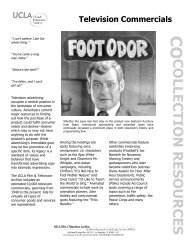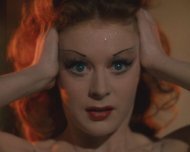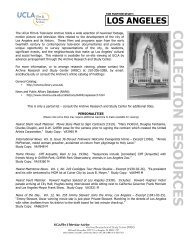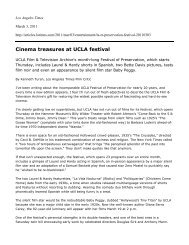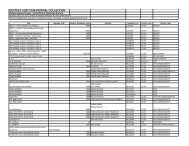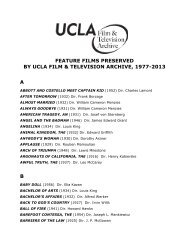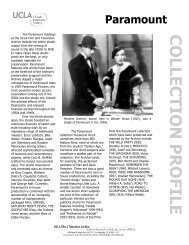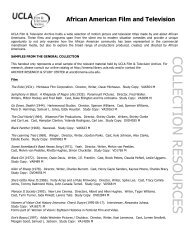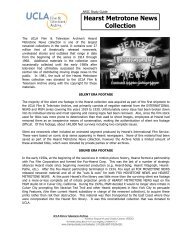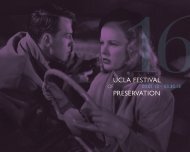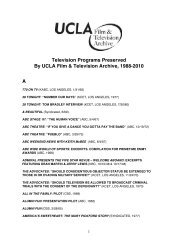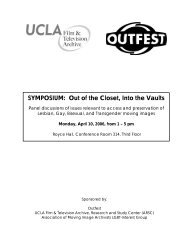"Heroic Grace" catalog - UCLA Film & Television Archive
"Heroic Grace" catalog - UCLA Film & Television Archive
"Heroic Grace" catalog - UCLA Film & Television Archive
Create successful ePaper yourself
Turn your PDF publications into a flip-book with our unique Google optimized e-Paper software.
ONE-ARMED SWORDSMAN [DUBI DAO]<br />
Hong Kong 1967 Director: Zhang Che<br />
Zhang Che’s riveting revenge thriller is often identified as the key transitional film between the “old school” wuxia (swordplay) picture and what we<br />
now think of as the kung fu movie. And indeed, all the standard kung fu plot features are already firmly in place. The eponymous hero, Fang Gang,<br />
played with sullen charisma by Jimmy Wang Yu, is an orphaned “scholarship student” at a ritzy martial arts academy, a resentful commoner persecuted<br />
by the sneering gentry. He endures their bullying stoically, until his sifu’s spoiled daughter (Qiao Qiao) happens to spy on him as he chops<br />
wood, shirtless and gleaming. Infuriated by her own desire, she takes out her Lawrencian frustration upon its object by chopping off one of his<br />
arms. (You don’t have to be a psychoanalyst to parse the symbolism.) During a sojourn in the wilderness Fang masters the unfamiliar art of fighting<br />
left-handed with his broken blade, and returns home to trounce his astonished enemies—who in the meantime have perfected an unsportsmanlike<br />
“sword clamp” device that turns out to be useless against Fang’s stubby weapon.<br />
ONE-ARMED SWORDSMAN created a revolution in the genre with its innovative emphasis on match-ups among various fighting styles and the warrior’s<br />
training process. Even in its visual details the film announces the arrival of a new kind of hero: Wang Yu wears simple, functional clothing<br />
modeled on the dusty homespun of the ronin samurai (especially Zatoichi) that inspired director Zhang and screenwriter Ni Kuang, while his snooty<br />
persecutors sport layered sword-dude outfits trimmed with animal fur, like those worn by the stalwart prigs in conventional wuxia B pictures.<br />
—David Chute<br />
Studio: Shaw Brothers. Producer: Runme Shaw (Shao Renmei). Screenplay: Ni Kuang, Zhang Che. Cinematography: Yuan Zengshan, Guan Hanle. Martial<br />
Arts Directors: Tong Kai (Tang Jia), Lau Kar-leung (Liu Jialiang). Art Director: Chen Qingshen. Editor: Jiang Xinglong. Sound: Wang Yonghua. Music: Wang<br />
Fuling. Cast: Jimmy Wang Yu, Ban Yinze, Qiao Qiao, Zhang Beishan, Huang Zongxun.<br />
35mm, in Mandarin with English subtitles, 111 min.<br />
Print Source: Celestial Pictures Ltd.<br />
© Licensed by Celestial Pictures Ltd. (a company incorporated in Hong Kong SAR).<br />
All rights reserved.<br />
N I K UA N G (Ngai Hong)<br />
Prolific novelist and screenwriter Ni Kuang is estimated to<br />
have churned out over 400 scripts and 300 pulp adventure<br />
novels over the course of a 50-year career. Ni Kuang emigrated<br />
to Hong Kong from Shanghai in 1957 and initially made his<br />
living writing wuxia serials for daily newspapers. When several<br />
of these were successfully filmed (including THE SIX-FIN-<br />
GERED LORD OF THE LUTE, 1965), he was recruited by Shaw<br />
Brothers to be a screenwriter. His first produced script for<br />
Shaw was ONE-ARMED SWORDSMAN (1967).<br />
In the late ’70s Ni Kuang wrote the majority of scripts<br />
directed by Zhang Che, Lau Kar-leung and Chu Yuan (Chor<br />
Yuen). He also penned the first two Bruce Lee vehicles THE BIG<br />
BOSS (1971) and FIST OF FURY (a.k.a. THE CHINESE CONNECTION,<br />
1972). In the 1980s Ni Kuang returned to fiction writing. His<br />
most popular pulp hero, the globetrotting occult investigator<br />
Wai Shut-lee (“Wisely”), has been portrayed onscreen by<br />
Chow Yun-fat and Andy Lau, among others.<br />
36<br />
ZHANG CHE (Chang Cheh, 1923-2002)<br />
The celebrated “Godfather” of the Hong Kong action cinema<br />
began as a screenwriter in the late ‘40s in Shanghai. He directed<br />
his first film in Taiwan in 1949 before moving to Hong Kong in<br />
1957. Zhang joined MP & GI (Cathay studio’s predecessor) as a<br />
screenwriter in 1960 but departed two years later for Shaw<br />
Brothers. The success of TIGER BOY (1964) propelled Zhang into<br />
a decade-long career zenith during which he directed some of<br />
the martial arts genre’s best-known classics: ONE-ARMED<br />
SWORDSMAN (1967), GOLDEN SWALLOW (1968), VENGEANCE! (1970),<br />
THE BOXER FROM SHANDONG (1972), BLOOD BROTHERS (1973), and<br />
DISCIPLES OF SHAOLIN (1975).<br />
Zhang claimed to have overturned the primacy of female<br />
stars in the Hong Kong film industry with his aesthetics of masculine<br />
violence and his grooming of male stars, including Jimmy<br />
Wang Yu, David Jiang Dawei (David Chiang), Di Long (Ti Lung), and<br />
Alexander Fu Sheng. Among his protégés behind the camera is<br />
director John Woo. For a short spell in the late ’70s, Zhang went<br />
independent with his own production company, culminating with<br />
the late-career highpoint, THE FIVE VENOMS (1978). He worked<br />
sporadically in the ‘80s and made his last film in 1993.<br />
WEDNESDAY MARCH 12



